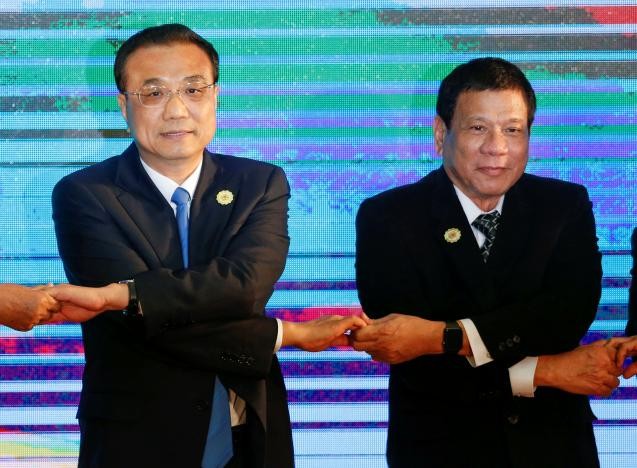Media Report

- Reuters reports: "The Philippines said on Wednesday it was 'gravely concerned' that Chinese boats were preparing to build structures at a disputed shoal in the South China Sea, shattering an appearance of cordiality at an Asian summit in Laos. Officials said talks between Southeast Asian leaders and Chinese Premier Li Keqiang went smoothly....But, hours before the meeting, the Philippines' defense ministry released photographs and a map showing what it said was an increased number of Chinese vessels near Scarborough Shoal, which China seized after a standoff in 2012....China said there had been no change in the situation around the shoal and it had not taken any new action there. 'Given this situation, some people are hyping the situation by spreading that kind of information,' Chinese Foreign Ministry spokeswoman Hua Chunying told a daily briefing in Beijing."
- Foreign Policy: Argument comments: "President Barack Obama's trip to Asia this week marks the final lap in his acclaimed 'pivot' or 'rebalance' to Asia...The priorities for Asia were not laid out in any formal 'pivot' document largely because the goals, based on my many conversations with Obama's Asia team, were modest: 1) deeply engage China; 2) balance this with a strong alliance with Japan; 3) address the North Korean problem; and 4) re-evaluate free-trade agreements...Events in the first 18 months of Obama's presidency undermined each of these objectives. In the case of China, Beijing disappointed America's G2 policy by not delivering on climate change at the 2009 Copenhagen summit (it would do better in Paris in 2015); moreover, it launched what would become an unprecedented set of territorial claims in the East and South China Seas....More than China, however, the biggest strategic surprise in Asia was domestic-political change in Japan...As much as the administration would like to take a victory lap in Asia, the legacy of the pivot is only partially complete. And it is on the China account where there remains much work."
- The Washington Post comments: "[A]n election in Hong Kong last weekend provided strong evidence that...Beijing's growing repression and nationalism under President Xi Jinping have backfired. Two years ago, the Communist regime touched off mass protests in Hong Kong by refusing to allow fully democratic elections for the city's chief executive....The response of Hong Kong's electorate was to turn out Sunday in record numbers to hand pro-democracy forces a decisive victory in elections for the Legislative Council. Most important, six candidates favoring consideration of independence from Beijing swept to victory....Moreover, the cause of Hong Kong independence — a direct response to Beijing's past repression — has been legitimized for the first time....The rebuff confronts Mr. Xi with a dilemma: conciliate with the opposition, including those who still favor Chinese sovereignty over Hong Kong, or crack down still harder."
Calendar
- 2016-09-06 Global leaders test limits of spreading wealth
- 2016-09-05 Seeking smoother summit, ASEAN to skirt mention of South China Sea ruling
- 2016-09-04 China, US talks 'extremely productive'
- 2016-09-02 Hangzhou G20: China's ambitions for global leadership
- 2016-09-01 Obama Heads to Asia Seeking Breakthrough on Trade and Climate Change
- 2016-08-31 China Will Have to Get Used to Being a Terrorist Target
- 2016-08-30 China’s Passive-Aggressive Diplomacy
- 2016-08-29 Why China won’t own next-generation manufacturing
- 2016-08-28 Beneath Yuan's Quiet, China Worries Rise
- 2016-08-26 They built towering new cities in China. Now they're trying it in downtown L.A.
News
- The Washington Post Philippines broadens claims of Chinese reach into disputed South China Sea
- TIME The Chinese Coast Guard is Involved in Most South China Sea Clashes, Survey Finds
- The New York Times Bad Luck and Worse Manners Tarnish Obama's Asia Trip
- The Wall Street Journal Rodrigo Duterte Throws a Grenade in Washington's China Strategy
- The Washington Post China vetoed from becoming 2nd biggest Australia farm owner
- Reuters Tensions over South China Sea belie summit cordiality
- Bloomberg Markets Tens of Thousands of Jobs Go as China's Biggest Banks Cut Costs
- The New York Times China's Tech-Savvy, Burned-Out and Spiritually Adrift, Turn to Buddhism
- The Wall Street Journal China Vows to Strike Back Over Embassy Attack in Neighboring Kyrgyzstan
- ABC News China Vetoed From Becoming 2nd Biggest Australia Farm Owner
- Reuters China offers 'free screening' for travelers from Zika-hit countries
- CNBC Landmark US-China climate deal to half thermal coal trade: WoodMac
- Bloomberg Business China's Export Machine Is Grabbing More of the Global Market
Commentary
- Foreign Policy: Argument The Unfinished Legacy of Obama's Pivot to Asia
- The Washington Post Chinese repression is backfiring in Hong Kong
- The New York Times: The Opinion Pages Australia Needs the United States to Keep China in Check
- Bloomberg View Obama's Pivot to Asia Fails to Deter China
- The Financial Times International diplomatic incidents bring benefits for China
- The Washington Post Air China's shocking advice for London visitors: 'Precautions are needed' in Indian, Pakistani, black neighborhoods
- The Los Angeles Times China, U.S. join sweeping climate deal
